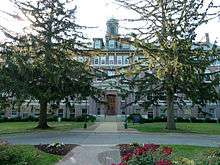Mount Mercy University
 Warde Hall | |
| Type | Private |
|---|---|
| Established | 1928 |
| Affiliation |
Roman Catholic (Sisters of Mercy) |
| Endowment | $23.6 million[1] |
| President | Laurie Hamen |
| Students | 1,824 (1,115 full-time) |
| Location | Cedar Rapids, IA, USA |
| Campus | Urban, 40 acres |
| Athletics | NAIA – MCC |
| Nickname | Mustangs |
| Affiliations |
CMHE ACCU CIC NAICU |
| Website | mtmercy.edu |
Mount Mercy University is a four-year, co-educational Catholic liberal arts university located in Cedar Rapids, Iowa, United States. The school was founded by the Sisters of Mercy in 1928.
Students take a core of liberal arts courses providing a comprehensive foundation for many specific areas of study including: English, fine arts, history, mathematics, multicultural studies, natural science, philosophy, religious studies, social science and speech/drama. The university offers more than 45 undergraduate programs of study and six graduate programs. A number of these programs are available for online learning.
Campus
Mount Mercy University's 40-acre campus is located in a tree-lined residential neighborhood in the heart of Cedar Rapids, Iowa (population 126,326).
History
Mount Mercy University was founded as a two-year college for women in 1928 by the Sisters of Mercy of Cedar Rapids, Iowa. The Sisters of Mercy, whose order was founded in 1831 by Catherine McAuley in Dublin, Ireland, have been active in Cedar Rapids since 1875. The college was an outgrowth of their concerns about the education of women.
In 1957, Mount Mercy became a four-year institution and awarded its first bachelor's degree in 1959. The college received accreditation as a baccalaureate institution by the North Central Association in 1960. In 1968 the Sisters of Mercy transferred their legal authority and responsibility to a self-perpetuating independent board of which three members would always be Sisters of Mercy. Mount Mercy College became coeducational in 1969. While integrating a strong liberal arts component, the college has always emphasized professional development from its early involvement, as a junior college, on business courses and teacher education. The departments of nursing, education and social work were accredited in the 1960s and 1970s as the four-year programs developed. Begun in 1997, the Adult Accelerated program, a joint Mount Mercy University/Kirkwood Community College accelerated degree completion program for working adults meets an important community workforce development need.
On August 23, 2010 the institution was re-designated as a university.
Presidents
- Sister Mary Ildephonse Holland, 1928–1933, 1946–1961
- Sister Mary Cornelia Burke, 1933 to 1939
- Sister Mary Maura Marron, 1939–1946
- Sister Mary Agnes Hennessey, 1961–1977
- Dr. Thomas R. Feld, 1977–1999
- Dr. Robert Pearce, 1999–2006
- Dr. Christopher R.L. Blake, 2006 – 2013
- Dr. Laurie Hamen, 2014–present
Enrollment
- 1,824 students; 1,115 full-time.
- Average high school GPA is 3.44; 89 percent are in the top half of their class.
- Ninety four percent of freshmen from Iowa; 6 percent from out of state, primarily in the Midwest.
- One hundred percent of new full-time freshmen receive some form of institutionally funded financial aid; Over $7.8 million in institutional grants was awarded in 2010-2011.
Non-traditional programs
Mount Mercy offers accelerated degree programs for working adults. These include a degree completion program for RNs, and majors in accounting, business, applied management, finance, human resource management, management information systems and marketing through a joint program with Kirkwood Community College. The university also offers six master's degree programs and a number of online degrees.
Library
The 65,000-square-foot (6,000 m2) Busse Library is a facility with over 100 computers and 130,000 volumes and over 11,000 eBooks. Online resources are available 24 hours a day to faculty, staff and students.
Newspaper
Mount Mercy Times is the official newspaper of the university. It was founded in 1994 and now reaches over 4,000 readers in the Cedar Rapids community on a weekly basis. Mount Mercy Times is housed in the basement of Busse Library.
Athletics
Mount Mercy teams are known as the Mustangs. The university is a member of National Association of Intercollegiate Athletics (NAIA), competing in the Heart of America Athletic Conference . Men's sports include baseball, basketball, bowling, cross country, golf, soccer, track & field, and volleyball; while women's sports include basketball, bowling, cross country, golf, soccer, softball, track & field and volleyball.
Intramural activities include basketball, volleyball, golf, flag football, softball and cross country.
Alumni
Of graduates over the past three years, 95 percent are employed or in graduate school within six months of graduation, 53 percent remain in the Cedar Rapids metropolitan area and 91 percent remain in Iowa.
References
- ↑ As of June 30, 2010. "U.S. and Canadian Institutions Listed by Fiscal Year 2009 Endowment Market Value and Percentage Change in Endowment Market Value from FY 2009 to FY 2010" (PDF). 2009 NACUBO-Commonfund Study of Endowments. National Association of College and University Business Officers.
External links
Coordinates: 42°0′8.08″N 91°39′5.49″W / 42.0022444°N 91.6515250°W
